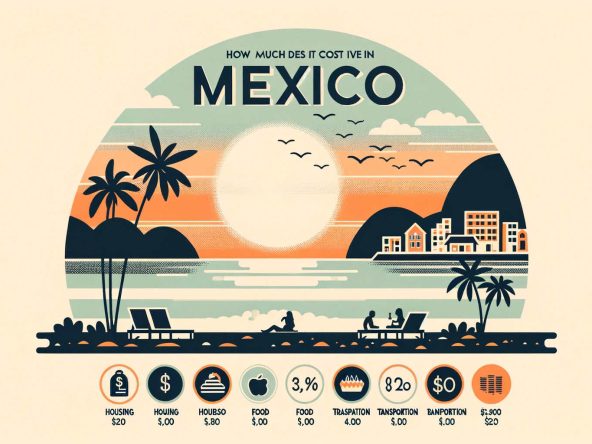Buying Property in Mexico as an American or Expat
The Complete Guide
1. Restrictions on Foreign Buyers
The Mexican constitution restricts foreign buyers from purchasing property within restricted zones, 50km (31 miles) from the coastline and 100km (62 miles) from borders. Americans and other foreigners cannot directly own property within these zones, but beneficial rights can be obtained through a trust called a fideicomiso.
2. Purchasing Coastal & Border Property
Foreign nationals are strictly prohibited from directly owning property in restricted zones per Mexico’s Foreign Investment Law. Americans and other expats can only purchase coastal or border property by setting up a fideicomiso. This legal trust allows the foreign buyer to have all rights of ownership even though a Mexican bank holds legal title.
3. Understanding Fideicomisos
A fideicomiso functions as a legal trust set up with a Mexican bank to allow foreigners to purchase property in restricted zones where direct foreign ownership is not permitted. The bank holds official legal title to the property but does not benefit from the trust assets. Instead, they manage the trust on behalf of the American or expat, who is granted all other customary ownership rights, including usage, rental, sale, etc.
4. Expected Fees & Closing Costs
When budgeting for a property purchase in Mexico, foreigners should account for a range of closing fees and costs amounting from 1-5% of total property value, in addition to the negotiated sale price. This includes charges from notaries, bank trusts, appraisers, and applicable taxes and duties. Closing costs tend to run higher for restricted zone properties held under fideicomisos.
5. Hiring a Specialized Real Estate Agent
It is highly advisable for Americans and expats buying property to engage with an in-Mexico real estate agent specializing in purchases for overseas, non-Mexican buyers. These agents are experts in guiding foreign investors through the entire process – from initial search to negotiations, drafting contracts, and liaising with sellers, lawyers, and other professionals to close the purchase.
6. Working with a Mexican Real Estate Attorney
In addition to a real estate agent, retaining an attorney well-versed in Mexican property law is crucial when buying property in Mexico. Attorneys ensure foreigners’ interests are fully protected, thoroughly review all relevant contracts/documentation, and oversee formalities around properly executing title transfers, obtaining required permits/authorizations, registering deed changes, and fulfilling tax obligations – thereby minimizing legal risks.
7. Financing Options Available
There are several options Americans and ex-pats can consider for financing a Mexican property purchase:
Mexican bank mortgages
Seller financing
International loans
Home equity loans
Personal savings
Borrowing from family/friends
Mexican banks offer mortgages to foreigners, but generally at higher interest rates and lower loan-to-value ratios than U.S. loans.
8. Taxes and Costs to Budget For
When budgeting to purchase property in Mexico, buyers should account for:
Federal purchase transfer tax
State/municipal acquisition tax
Property registration fees
Capital gains tax (if reselling)
Annual property tax
Community fees (for developments)
Notary, appraisal, and transfer charges
Utilities, maintenance costs
9. Title Insurance
While still uncommon, title insurance is increasingly available in Mexico through domestic providers. It protects against claims challenging one’s rights to the property. Title insurance usually costs 0.5-1% of property value.
10. Conducting Due Diligence
Before finalizing a purchase, foreigners should conduct careful due diligence by:
Ordering a title search from a notary
Checking for liens, claims, encumbrances
Verifying no unpaid property taxes
Reviewing terms of current/previous fideicomiso
11. Permits Required After Purchase
Depending on the intended plans for the land, foreigners may need to obtain permits or authorizations from local authorities after purchase, such as:
Construction permits
Zoning permits
Environmental impact assessments
Agricultural, commercial, and industrial activity permits
It’s crucial to consult zoning regulations and restrictions in the municipality early.
12. Property Taxes in Mexico
Mexican property taxes are referred to as “predial.” Rates range from 0.1% – to 1% and are calculated based on property value. They are paid annually or semi-annually to the municipal government. Fideicomiso properties may have slightly higher property tax rates.
13. Making Offers Directly vs Through Agent
Most property purchases in Mexico involve making initial offers through listing real estate agents instead of directly interacting with sellers. Agents act as reliable intermediaries, facilitating negotiations and drawing up contracts once sale terms are agreed.
14. Closing Customs and Processes
The closing process differs from the U.S. – it involves signing pa promissory purchase agreement before a notary rather than handling it directly between parties. Notaries verify legal ownership status and oversee tax fee clearance. Closing occurs once funds are transferred, and new deeds are registered.
15. Getting a U.S. Mortgage
Some U.S. banks may offer mortgages for Mexican property purchases, but it is uncommon. Acquiring financing from Mexican bank sources is more realistic. An alternative is getting a home equity loan against existing U.S. property.
16. Visa Requirements
Most foreigners do not require Mexican visas for temporary stays while searching for property or finalizing purchases. But for residence exceeding six months, proper permits must be obtained from Mexican immigration authorities.
Frequently Asked Question: Can Americans buy land in Mexico?
1. Yes, Americans can buy land in Mexico.
2. Are there any restrictions or limitations for Americans buying land in Mexico?
Yes, there are certain restrictions and limitations for Americans buying land in Mexico, particularly in the restricted zones near the coast and borders.
3. What are the restricted zones in Mexico?
Restricted zones in Mexico refer to areas within 50 kilometers (31 miles) of the coast or 100 kilometers (62 miles) of the borders, where special regulations apply for foreign land ownership.
4. How can Americans buy land in the restricted zones?
Americans can buy land in the restricted zones by setting up a fideicomiso, a bank trust that allows non-Mexican citizens to hold property rights in these areas.
5. What is a fideicomiso?
A fideicomiso is a bank trust established by a foreigner to hold property rights in the restricted zones of Mexico. A Mexican bank has the trust on behalf of the foreign buyer.
6. Are there any additional steps or requirements for Americans buying land in Mexico?
Americans must conduct thorough due diligence, hire a reputable lawyer, and ensure all necessary permits and paperwork are in order before purchasing land in Mexico.
7. Hire a Real Estate Agent:
Engage a reputable real estate agent who specializes in international transactions and knows the local market.
8. Legal Assistance:
Consult a Mexican attorney who can guide you through the legal process and ensure compliance with Mexican laws.
9. Due Diligence:
Conduct a thorough investigation of the property, including verifying ownership, checking for liens or encumbrances, and assessing the land’s suitability for your intended use.
10. Purchase Agreement:
Negotiate and sign a purchase agreement that outlines the terms and conditions of the transaction, including the purchase price, payment terms, and any contingencies.
11. Title Search:
Conduct a title search to confirm the property’s legal status and ensure no outstanding issues.
12. Closing Process:
Work with your attorney to complete the necessary paperwork, obtain permits, and pay applicable taxes or fees.
13. Title Transfer:
Once all requirements are met, the property’s title can be transferred to your name.
14. Property Registration:
Register the property with the Public Registry of Property to establish legal ownership.
15. Ongoing Obligations:
Be aware of your ongoing obligations as a landowner in Mexico, such as property taxes and compliance with local regulations.
Conclusion
Buying land in Mexico as an American requires thorough research, legal assistance, and careful due diligence to ensure a smooth and legally compliant transaction.
Please get in touch with us if you need to purchase land in Mexico as an American or expat.








